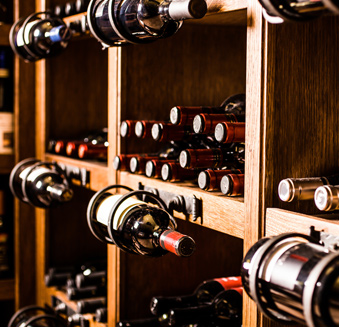Insuring Your Wine Collection

For many wine lovers, it can take a lifetime to build a collection of fine wines. For these individuals, the years of searching the world’s wineries for the finest vintages is not simply a hobby, it is a passion.
Serious wine collectors understand the need to protect their wine cellars. If something unexpected occurred to your collection, would you be able to pay for the replacement value of your bottles in hard earned cash?
What defines a collection that has to be insured?
Basically, the criteria for a wine collection that might require having insurance lies in the eye of the beholder. Like any other collection of personal belongings (fine art, stamps, coins, vintage automobiles, sports memorabilia, etc.), a wine collection is worth insuring if the collection is of value to the owner or if the owner feels the desire to protects their assets.
However, in general, people with a collection of 50 bottles or more should reap the benefits of wine insurance. The common fallacy is that wine lovers take for granted their wine is covered under their regular homeowners’ policy under the personal property bracket. What they don’t grasp, however, is that doing so is not sound since those limitations can be reached fairly quickly given the high value of the wine combined with other home content.
A word of advice for insuring your wine.
Get in touch with your insurance company. It usually starts by talking with your insurance agent and get to know the different packages of coverage available. If your insurance company doesn’t offer wine insurance, look for a specialized agent with expertise in wine-collection coverage.
Obtain detailed information. A common error made when getting wine protection is not asking about the extent of the damage protection. If you posses several thousand dollars of wine in storage, you definitely want to make sure your policy provides protection on a global basis which including warehouses and storage facilities as well as wine in your home.
Get an estimate. To find out the appropriate economic coverage, you need to know the dollar worth of your collection. Get a wine appraisal specialist to get you an estimate before choosing a policy plan.
Maintain a record of your holdings. An accurate inventory with an up-to-date value helps you and your insurance carrier understand your needs and aids you manage your collection in the event that bottles get damaged.
Assess your storage space. In some cases, you might need additional coverage to insure the storage area. Discuss with the insurance about your wine aging system or other important features that you’ve added to your residence to protect and store your wine.
Compare quotes. Before you sign on a insurance, it is imperative to get other quotes to make sure you’re getting the best coverage for the best price. Get at least three quotes before deciding.
Wine storage Recommendations
If your wine collection is at your home, consider the following guidelines to minimize damage to your bottles:
1. Do not stock chemicals, paint or strong odour-substances near your
collection. These items can penetrate through the cork and destroy the wine.
2. Do not keep wine near heaters or sunlight, or in areas that present a risk of flooding, such as
Bathroom or laundry room.
3. Also avoid keeping bottles in home areas next to a home theatre which causes excess
vibrations.
4. Keep wine at 13 degrees Celsius. Also, the humidity in a wine storage system should be in the 65 to 75 per cent. Anything that falls outside those brackets could damage the label or cork.
5. Install an alarm that warns against theft, temperature changes and moisture. When choosing an alarm, purchase one that sends a message directly to your mobile device.





